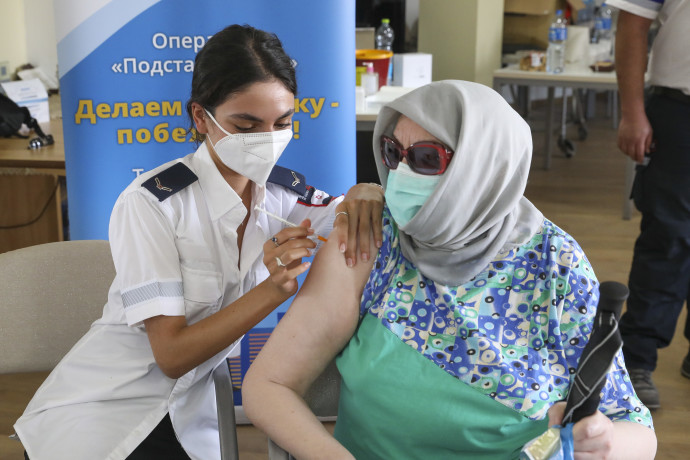Individuals who take the
Pfizer coronavirus vaccine may suffer from four out of up to 25 clinically relevant side effects: myocarditis, swelling of the lymph nodes, appendicitis and herpes zoster, according to a new Israeli-American study.
In contrast, high rates of multiple serious adverse events were associated with coronavirus infection among unvaccinated patients, including a greatly increased risk of developing myocarditis, pericarditis, arrhythmias, heart attacks, strokes, pulmonary embolism, deep-vein thrombosis or acute kidney damage, the study indicated.
Myocarditis is an inflammation of the heart muscle. Unvaccinated people who contracted
COVID-19 were four times more likely to develop myocarditis than vaccinated people were. There were around 2.7 cases of myocarditis per 100,000 vaccinated people infected with the virus, compared with 11 cases per 100,000 unvaccinated people who were infected.
cnxps.cmd.push(function () { cnxps({ playerId: ’36af7c51-0caf-4741-9824-2c941fc6c17b’ }).render(‘4c4d856e0e6f4e3d808bbc1715e132f6’); });
if(window.location.pathname.indexOf(“656089”) != -1){document.getElementsByClassName(“divConnatix”)[0].style.display =”none”;}else if(window.location.pathname.indexOf(“/israel-news/”) != -1){ document.getElementsByClassName(“divConnatix”)[0].style.display =”none”; var script = document.createElement(‘script’); script.src = ‘https://player.anyclip.com/anyclip-widget/lre-widget/prod/v1/src/lre.js’; script.setAttribute(‘pubname’,’jpostcom’); script.setAttribute(‘widgetname’,’0011r00001lcD1i_12258′); document.getElementsByClassName(‘divAnyClip’)[0].appendChild(script);}else if(window.location.pathname.indexOf(“/health-science/”) != -1){ document.getElementsByClassName(“divConnatix”)[0].style.display =”none”; var script = document.createElement(‘script’); script.src = ‘https://player.anyclip.com/anyclip-widget/lre-widget/prod/v1/src/lre.js’; script.setAttribute(‘pubname’,’jpostcom’); script.setAttribute(‘widgetname’,’0011r00001lcD1i_12246′); document.getElementsByClassName(‘divAnyClip’)[0].appendChild(script);}
“These results show convincingly that this mRNA vaccine is very safe and that the alternative of ‘natural’ morbidity caused by the coronavirus puts a person at significant, higher and much more common risk of serious adverse events,” said Prof. Ran Balicer, senior author of the study, director of the Clalit Research Institute and chief innovation officer for Clalit Health Services.
“These data should facilitate informed individual risk-benefit decision-making and, in our view, make a strong argument in favor of opting in to get vaccinated, especially in countries where the virus is currently widespread,” he said.
Balicer also serves as chairman of Israel’s national expert advisory team on the COVID-19 response. The study was published in the New England Journal of Medicine.
Specifically, the study was conducted by Clalit Health Services in collaboration with Harvard University. It examined more than two million Israelis, including vaccinated and unvaccinated, those who had COVID-19 and those who did not.
The research was conducted in Israel and was funded in part by the newly announced Ivan and Francesca Berkowitz Family Living Laboratory, a collaborative project between Harvard and Clalit.
 Third vaccine doses being administered at the Amigdor Retirement Residence by Magen David Adom (MDA), Jerusalem, August 5, 2021.MARC ISRAEL SELLEM
Third vaccine doses being administered at the Amigdor Retirement Residence by Magen David Adom (MDA), Jerusalem, August 5, 2021.MARC ISRAEL SELLEMResearchers compared rates of 25 adverse events that may develop in the short to medium term after vaccination between vaccinated and unvaccinated individuals and, separately, between unvaccinated individuals infected and not infected with COVID-19. Unlike previous studies that relied on voluntary active reporting by vaccinated individuals, this one relied on the analysis of millions of anonymized electronic medical records.
“The extensive nationwide rollout of Israel’s COVID-19 vaccination campaign provided the Clalit Research Institute with a unique opportunity to assess, through its rich and comprehensive digital datasets, the safety of the vaccine in a real-world setting without needing to rely on individual-driven active reporting of side effects,” Balicer said.
THE VACCINATION analysis took place between December 20, 2020, and May 24, 2021. It included 884,828 vaccinated individuals over the age of 16 and 884,828 unvaccinated individuals who were matched based on sociodemographic, geographic and health-related attributes with the vaccinated cohort.
The infection outcomes analysis took place between March 1, 2020, and May 24, 2021, and included 173,106 unvaccinated individuals who were infected with the coronavirus, compared with 173,106 matched controls who were not infected.
“The original trial of the Pfizer/BioNTech vaccine provided evidence of its safety, but the estimates were too imprecise given the small sample size,” said Prof. Miguel Hernán of the Harvard T.H. Chan School of Public Health, director of the CAUSALab.
“This analysis of Clalit’s high-quality database emulates the design of the original trial, uses its findings as a benchmark and expands upon them to confirm the vaccine’s safety on a wide range of adverse events,” he said. “This combination of evidence from randomized trials and observational studies is a model for efficient medical research, something which is especially important in COVID times.”
Pfizer’s Phase III randomized clinical trial included 21,720 vaccinated individuals.
In addition to the incidence of myocarditis resulting from vaccination compared with having COVID-19, the other three side effects associated with vaccination were swelling of the lymph nodes (78 cases per 100,000), appendicitis (five cases) and herpes zoster (16 cases).
A much longer list of side effects was linked to the virus: cardiac arrhythmias (166 cases per 100,000 infected patients), kidney damage (125 cases), pericarditis (11 cases), pulmonary embolism (62 cases), deep-vein thrombosis (43 cases), myocardial infarction (25) and stroke (14).
“To date, one of the main drivers of vaccine hesitancy has been a lack of information regarding potential side effects of the vaccine,” said Prof. Ben Reis, director of the Predictive Medicine Group at the Boston Children’s Hospital Computational Health Informatics Program and Harvard Medical School. “This careful epidemiological study provides reliable information on vaccine safety, which we hope will be helpful to those who have not yet decided about vaccination.”
 Third vaccine doses being administered at the Amigdor Retirement Residence by Magen David Adom (MDA), Jerusalem, August 5, 2021.MARC ISRAEL SELLEM
Third vaccine doses being administered at the Amigdor Retirement Residence by Magen David Adom (MDA), Jerusalem, August 5, 2021.MARC ISRAEL SELLEM



